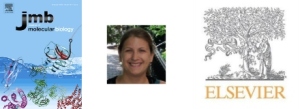The Meyerhoff Graduate Fellows Program at UMBC, and PROMISE: Maryland’s AGEP (the National Science Foundation’s PROMISE AGEP – Maryland Transformation, AGEP-T) for the State of Maryland, proudly present Dr. Hélène Hodak, Scientific Editor, Journal of Molecular Biology, Elsevier Inc. on Friday, Feb. 6, 2015.
 Dr. Hodak will be talking about writing for high impact journals. We’ve often heard the term “publish or perish.” Many people are afraid of that term, and many are nervous about the idea of needing to publish in order to have their work deemed worthy. The Elsevier journals are known for being high-impact, and they have a global reputation for showcasing the best work in science. They have offices in NY, Amsterdam, and London. People from all disciplines are invited to come to the workshop and use the content of this talk to learn more about how to think about publishing, and how to dismiss fear of the process. Dr. Hodak’s background and training hail from the following institutions: Yale University, Institut Pasteur de Lille, Regional Hospital Center of Lille, France, Université Lille 2 – Droit et Santé; France. You can read more about Dr. Hodak’s scientific contributions on ResearchGate: http://www.researchgate.net/profile/Helene_Hodak2/citations
Dr. Hodak will be talking about writing for high impact journals. We’ve often heard the term “publish or perish.” Many people are afraid of that term, and many are nervous about the idea of needing to publish in order to have their work deemed worthy. The Elsevier journals are known for being high-impact, and they have a global reputation for showcasing the best work in science. They have offices in NY, Amsterdam, and London. People from all disciplines are invited to come to the workshop and use the content of this talk to learn more about how to think about publishing, and how to dismiss fear of the process. Dr. Hodak’s background and training hail from the following institutions: Yale University, Institut Pasteur de Lille, Regional Hospital Center of Lille, France, Université Lille 2 – Droit et Santé; France. You can read more about Dr. Hodak’s scientific contributions on ResearchGate: http://www.researchgate.net/profile/Helene_Hodak2/citations
——————————————————-
Details for the talk:
- Friday, February 6, 2015
- 4:30 – 6:00 PM
- UMBC Campus, Public Policy Building, Room 206
- Afternoon refreshments will be served.
To RSVP/Register:
- UMBC students/postdocs/faculty/staff: Login to your MyUMBC account. Click the green “I can attend” button at the bottom of the MyUMBC website for this event: http://my.umbc.edu/groups/promise/events/29770. If you have logged into MyUMBC, and you don’t see the green “I can attend button,” then please be sure that “join” the PROMISE group.
- Visitors (Visitors from any school within the University System of Maryland and the region are welcome to attend.): Use the comment section below to let us know that you are coming. Please add your name, school/organization, and discipline, as applicable.

Photo Credit: http://www.chimit09.org/images/PUP01.jpg

Public Policy Building, UMBC, atrium hallway. Photo credit: http://www.appam.org/assets/1/7/publicPolicy.jpg
Directions, parking, and other information will be posted in the comments below.
——————————————————-
Why is Elsevier so important? Here are some of the latest stats from 2014:
Journal Impact Factor Highlights
Amsterdam, 14 August, 2014
Elsevier, a world-leading provider of scientific, technical and medical information products and services, today announced the highlights of its journal Impact Factor performance in 2013. According to the 2013 Journal Citation Reports® (JCR) published by Thomson Reuters, Elsevier saw 61% of its journal Impact Factors increase from 2012 to 2013, well ahead of the aggregate across all other journals at 55%. Furthermore, 21% of Elsevier journals are in the top 10% of their subject category.
In 2013 Elsevier journals occupied the top position by Impact Factor in 61 subject categories, up from 58 in 2012. In addition, 14 Elsevier journals have risen to the top of their subject category and 40 journals have received an impact factor for the first time. Among these is Nano Energy, which published its first issue in 2012 and received an impressive first impact factor of 10.211.
 More about Elsevier: Elsevier Inc., 600 Technology Square, Cambridge, MA 02139, U.S.A. ElsevierConnect, http://www.sciencedirect.com/science/journal/00222836. Contact Dr. Hodak: http://www.journals.elsevier.com/journal-of-molecular-biology/editorial-board/helene-hodak/
More about Elsevier: Elsevier Inc., 600 Technology Square, Cambridge, MA 02139, U.S.A. ElsevierConnect, http://www.sciencedirect.com/science/journal/00222836. Contact Dr. Hodak: http://www.journals.elsevier.com/journal-of-molecular-biology/editorial-board/helene-hodak/
——————————————————-
Acknowledgements:
This workshop comes to UMBC through Dr. Michael Summers, and Ms. Justine Johnson of the Meyerhoff Graduate Fellows Program. http://my.umbc.edu/groups/meyerhoffgrad/events/28224. Additional sponsors include: PROMISE AGEP, The Graduate School at UMBC, and the UMBC Office of Postdoctoral Affairs.
About the Meyerhoff Graduate Fellows Program
Funded by an NIH-MBRS Initiative to Maximize Student Development (IMSD) grant, the Meyerhoff Fellows Program focuses on promoting cultural diversity in the biomedical sciences at the graduate level. Now in its 18th year, the program attracts students from such institutions as Duke, Emory, Stanford and the University of Delaware.
Read more>










